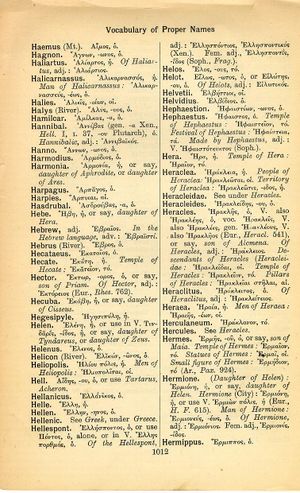Hecuba: Difference between revisions
(3_6) |
m (Text replacement - "}}]]" to "}}]]") |
||
| Line 1: | Line 1: | ||
{{WoodhouseENELnames | {{WoodhouseENELnames | ||
|Text=[[File:woodhouse_1012.jpg|thumb | |Text=[[File:woodhouse_1012.jpg|thumb | ||
|link={{filepath:woodhouse_1012.jpg | |link={{filepath:woodhouse_1012.jpg}}]]Ἑκάβη, ἡ, or say, <b class="b2">daughter of Cisseus.</b> | ||
}} | }} | ||
{{Lewis | {{Lewis | ||
Revision as of 10:09, 15 August 2017
English > Greek (Woodhouse)
Ἑκάβη, ἡ, or say, daughter of Cisseus.
Latin > English (Lewis & Short)
Hĕcŭba: ae, and Hĕcŭbē, ēs, f., = Ἑκάβη,
I the daughter of Dymas, wife of Priam; after the destruction of Troy the slave of Penelope, changed through rage into a dog, Verg. A. 2, 501; 515; Ov. M. 13, 423; 549 sq.; 577; Cic. Tusc. 3, 26, 63; id. Fat. 15, 34.—Transf., an ugly old woman (opp. to Andromache), Mart. 3, 76, 4.
Latin > French (Gaffiot 2016)
Hĕcŭba,¹² æ (-bē, ēs), f. (Ἑκάβη), Hécube, femme de Priam : Cic. Tusc. 3, 63 ; Virg. En. 2, 501 || fig. = femme vieille : Mart. 3, 76, 4.
Latin > German (Georges)
Hecuba, ae, f. u. Hecubē, ēs, f. (Ἑκάβη), Gemahlin des Königs Priamus in Troja, die als Gefangene mit den von Troja heimziehenden Griechen in den thrazischen Chersones kam u. dort dem Polymestor, dem Mörder ihres letzten Sohnes Polydorus, die Augen ausriß, der ihr dann weissagte, daß sie zur Hündin werden, in das Meer stürzen u. ihr Grab den Schiffern ein Wahrzeichen werden würde, was der Sage nach auch geschah, Ov. met. 13, 423 sqq. Plaut. Men. 714 u. 716. Cic. Tusc. 3, 63. Vgl. Cynos sema. – appellat., eine Hekuba = ein altes, garstiges Weib (Ggstz. Andromache), Mart. 3, 76, 4.

